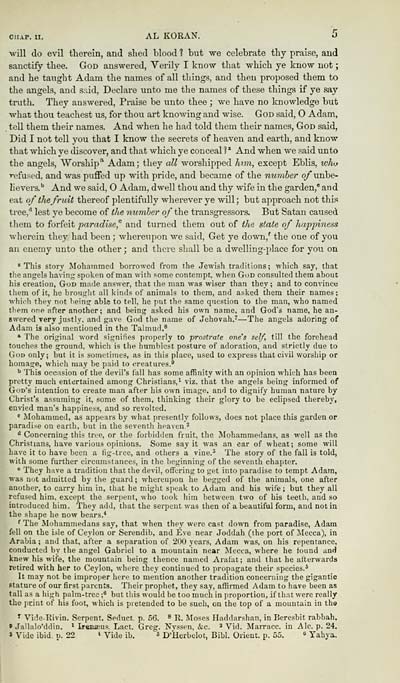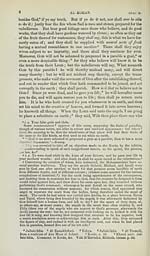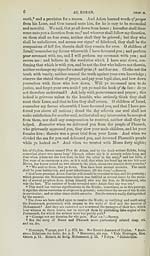Download files
Complete book:
Individual page:
Thumbnail gallery: Grid view | List view

CHAP. II. AL KORAN. 5
will do e\'il therein, and shed blood ? but we celebrate thy praise, and
sanctify thee. God answered, Verily I know that wliich ye know not ;
and he taught Adam the names of all things, and then proi^osed them to
the angels, and s;iid. Declare unto me the names of these things if ye say
truth. They answered. Praise be unto thee ; we have no knowledge Vjut
what thou teachest us, for thou art knowing and wise. God said, Adam,
tell them their names. And when he had told them their names, God said.
Did I not tell you that I know the secrets of heaven and earth, and know
that which ye discover, and that which ye conceal 1 ' And when we said unto
the angels, "Worship^ Adam; they all worshipped hun, except Eblis, lohi^
refused, and was puffed up with pride, and became of the number of unbe-
lievers.'' And we said, Adam, dwell thou and thy wfe in the garden," and
eat of the fruit thereof plentifully wherever ye will ; but approach not this
tree,'' lest ye become of the number of the transgi-essors. But Satan caused
them to forfeit paradise,^ and turned them out of tlte state of happiness
wherein they had been ; whereupon we said. Get ye down,' the one of you
an enemy unto the other ; and there shall be a dwelling-2)lace for you on
^ This story Mohammed borrowed from the Jewish traditions; which say, that
the angels having spoken of man with some contempt, when God consulted them about
his creation, God m.ide answer, that the man was wiser than they; and to convince
them of it, he brouglit all kinds of animals to them, and asked them their names;
which they not heins: abl« to tell, he put the same question to the man, who named
them one after another ; and being asked his own name, and God's name, he an-
swered very justly, and gave God the name of Jehovah. ^ — The angels adoring of
Adam is also mentioned in the Talmud.^
» The original word signifies properly to prostrate one's self, till the forehead
touches the ground, which is the humblest posture of adoration, and strictly due to
God only; but it is sometimes, as in this place, used to express that civil worship or
homage, which may be paid to creatures.*
'' This occasion of the devil's fall has some affinity with an opinion which has been
pretty much entertained among Christians,^ viz. that the angels being informed of
God's intention to create man after his own image, and to dignify human nature by
Christ's assuming it, some of them, thinking their glory to be eclipsed thereby,
enWed man's happiness, and so revolted.
« Mohammed, as appears by what presently follows, does not place this garden or
paradise on earth, but in the seventh heaven.^
^ Concerning this tree, or the forbidden fruit, the Mohammedans, as well as the
Christians, have various opinions. Some say it was an ear of wheat; some will
have it to have been a fig-tree, and others a vine.^ The story of the fall is told,
with some further circumstances, in the beginning of the seventh chapter.
* They have a tradition that the devil, offering to get into paradise to tempt Adam,
was not admitted by the guard; whereupon he begged of the animals, one after
another, to carry him in, that he might speak to Adam and his wife ; but they all
refused him, except the serpent, who took him between two of his teeth, and so
introduced him. They add, that the serpent was then of a beautiful form, and not in
the shape he now bears.*
' The Mohammedans say, that when they were cast down from paradise, Adam
fell on the isle of Ceylon or Serendib, and Eve near Joddah (the port of Mecca), in
Arabia ; and that, after a separation of 200 years, Adam was, on his repentance,
conducted by the angel Gabriel to a mountain near Mecca, where he found and
knew his wife, the mountain being thence named Arafat; and that he afterwards
retired with her to Ceylon, where they continued to propagate their species.*
It may not be improper here to mention another tradition concerning the gigantic
stature of our first parents. Their prophet, they say, affirmed Adam to have been as
tall as a high palm-tree ;* but this would be too much in proportion, if that were really
the print of his foot, which is pretended to be such, on the top of a mountain in the
"> Vide Rivin. Serpent. Seduct, p. 56. ^ K. Moses Haddarshan, in Beresbit rabbah.
» Jallalo'ddin. ^ Irftweus. Lact. Greg. Nvssen, &c. * Vid. Marracc. in Ale. p. 24.
» Vide ibid. p. 22 * Vide ib. « D'Herbelot, Bibl. Orient, p. 55. « Yahya..
will do e\'il therein, and shed blood ? but we celebrate thy praise, and
sanctify thee. God answered, Verily I know that wliich ye know not ;
and he taught Adam the names of all things, and then proi^osed them to
the angels, and s;iid. Declare unto me the names of these things if ye say
truth. They answered. Praise be unto thee ; we have no knowledge Vjut
what thou teachest us, for thou art knowing and wise. God said, Adam,
tell them their names. And when he had told them their names, God said.
Did I not tell you that I know the secrets of heaven and earth, and know
that which ye discover, and that which ye conceal 1 ' And when we said unto
the angels, "Worship^ Adam; they all worshipped hun, except Eblis, lohi^
refused, and was puffed up with pride, and became of the number of unbe-
lievers.'' And we said, Adam, dwell thou and thy wfe in the garden," and
eat of the fruit thereof plentifully wherever ye will ; but approach not this
tree,'' lest ye become of the number of the transgi-essors. But Satan caused
them to forfeit paradise,^ and turned them out of tlte state of happiness
wherein they had been ; whereupon we said. Get ye down,' the one of you
an enemy unto the other ; and there shall be a dwelling-2)lace for you on
^ This story Mohammed borrowed from the Jewish traditions; which say, that
the angels having spoken of man with some contempt, when God consulted them about
his creation, God m.ide answer, that the man was wiser than they; and to convince
them of it, he brouglit all kinds of animals to them, and asked them their names;
which they not heins: abl« to tell, he put the same question to the man, who named
them one after another ; and being asked his own name, and God's name, he an-
swered very justly, and gave God the name of Jehovah. ^ — The angels adoring of
Adam is also mentioned in the Talmud.^
» The original word signifies properly to prostrate one's self, till the forehead
touches the ground, which is the humblest posture of adoration, and strictly due to
God only; but it is sometimes, as in this place, used to express that civil worship or
homage, which may be paid to creatures.*
'' This occasion of the devil's fall has some affinity with an opinion which has been
pretty much entertained among Christians,^ viz. that the angels being informed of
God's intention to create man after his own image, and to dignify human nature by
Christ's assuming it, some of them, thinking their glory to be eclipsed thereby,
enWed man's happiness, and so revolted.
« Mohammed, as appears by what presently follows, does not place this garden or
paradise on earth, but in the seventh heaven.^
^ Concerning this tree, or the forbidden fruit, the Mohammedans, as well as the
Christians, have various opinions. Some say it was an ear of wheat; some will
have it to have been a fig-tree, and others a vine.^ The story of the fall is told,
with some further circumstances, in the beginning of the seventh chapter.
* They have a tradition that the devil, offering to get into paradise to tempt Adam,
was not admitted by the guard; whereupon he begged of the animals, one after
another, to carry him in, that he might speak to Adam and his wife ; but they all
refused him, except the serpent, who took him between two of his teeth, and so
introduced him. They add, that the serpent was then of a beautiful form, and not in
the shape he now bears.*
' The Mohammedans say, that when they were cast down from paradise, Adam
fell on the isle of Ceylon or Serendib, and Eve near Joddah (the port of Mecca), in
Arabia ; and that, after a separation of 200 years, Adam was, on his repentance,
conducted by the angel Gabriel to a mountain near Mecca, where he found and
knew his wife, the mountain being thence named Arafat; and that he afterwards
retired with her to Ceylon, where they continued to propagate their species.*
It may not be improper here to mention another tradition concerning the gigantic
stature of our first parents. Their prophet, they say, affirmed Adam to have been as
tall as a high palm-tree ;* but this would be too much in proportion, if that were really
the print of his foot, which is pretended to be such, on the top of a mountain in the
"> Vide Rivin. Serpent. Seduct, p. 56. ^ K. Moses Haddarshan, in Beresbit rabbah.
» Jallalo'ddin. ^ Irftweus. Lact. Greg. Nvssen, &c. * Vid. Marracc. in Ale. p. 24.
» Vide ibid. p. 22 * Vide ib. « D'Herbelot, Bibl. Orient, p. 55. « Yahya..
Set display mode to: Large image | Transcription
Images and transcriptions on this page, including medium image downloads, may be used under the Creative Commons Attribution 4.0 International Licence unless otherwise stated. ![]()
| Early Gaelic Book Collections > J. F. Campbell Collection > Koran: or, Alcoran of Mohammed > (159) |
|---|
| Permanent URL | https://digital.nls.uk/77135844 |
|---|
| Description | Volumes from a collection of 610 books rich in Highland folklore, Ossianic literature and other Celtic subjects. Many of the books annotated by John Francis Campbell of Islay, who assembled the collection. |
|---|
| Description | Selected items from five 'Special and Named Printed Collections'. Includes books in Gaelic and other Celtic languages, works about the Gaels, their languages, literature, culture and history. |
|---|

